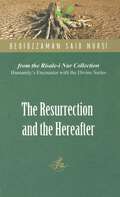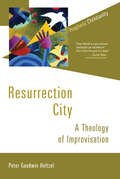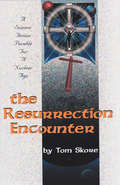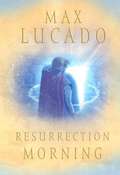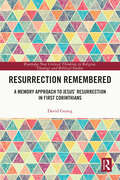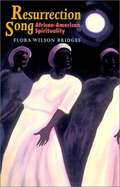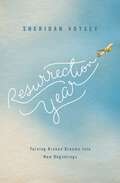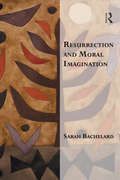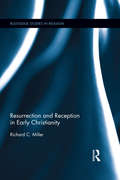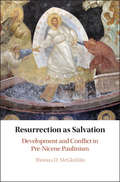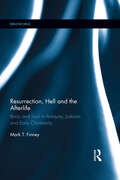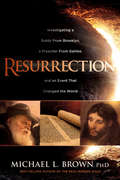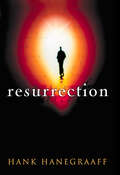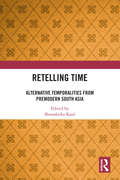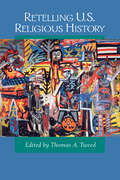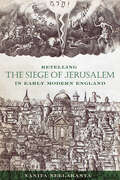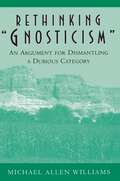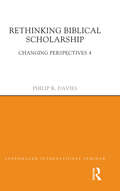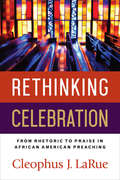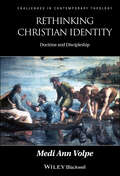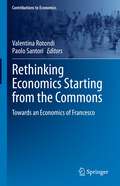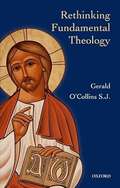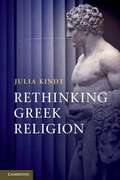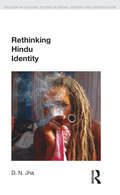- Table View
- List View
Resurrection And The Hereafter
by Bediuzzaman Said NursiThis book is a collection of letters and treatises by Bediuzzaman about resurrection and its basis in Islam. It includes the famous 10th Word from the book The Words.
Resurrection City: A Theology of Improvisation (Prophetic Christianity Series (PC))
by Peter Goodwin HeltzelIn Resurrection City Peter Heltzel paints a prophetic picture of an evangelical Christianity that eschews a majority mentality and instead fights against racism, inequality, and injustice, embracing the concerns of the poor and marginalized, just as Jesus did. Placing society's needs front and center, Heltzel calls for radical change and collective activism modeled on God's love and justice. In particular, Heltzel explores the social forms that love and justice can take as religious communities join together to build "beloved cities." He proclaims the importance of "improvising for justice" -- likening the church's prophetic ministry to jazz music -- and develops a biblical theology of shalom justice. His vision draws inspiration from the black freedom struggle and the lives of Sojourner Truth, Howard Thurman, and Martin Luther King Jr. Pulsing with hope and beauty, Resurrection City compels evangelical Christians to begin "a global movement for love and justice" that truly embodies the kingdom of God.
Resurrection Encounter: A science fiction parable for a nuclear age
by Tom SkoreIn need of restocking supplies, alien explorers enter into orbit over a vibrant, newly charted planet. On it they discover many diverse cultures, rich with tradition, and steeped in violence. Living within in this paradoxical mix is a man called Jesus: a being who will change the aliens' lives forever. Horrified by the impending crucifixion and the convoluted politics of ancient Rome, the aliens decide to intervene. But each action they take to help seems to draw them relentlessly closer to a date with destiny, and a modern world bent on nuclear extinction.
Resurrection Morning
by Max LucadoHow would you respond if you had watched Jesus die and rise again? Max Lucado brings to life the reaction of one of the Roman soldiers who was assigned to Golgotha and what he saw that resurrection morning while guarding Jesus' tomb. The soldier's search for answers about Jesus will resonate with children and adults alike. Lucado's story powerfully shows Christ's power to impact people's lives.
Resurrection Remembered: A Memory Approach to Jesus’ Resurrection in First Corinthians (Routledge New Critical Thinking in Religion, Theology and Biblical Studies)
by David GraiegThis book is the first major study to investigate Jesus’ resurrection using a memory approach. It develops the logic for and the methodology of a memory approach, including that there were about two decades between the events surrounding Jesus’ resurrection and the recording of those events in First Corinthians. The memory of those events was frequently rehearsed, perhaps weekly.The transmission of the oral tradition occurred in various ways, including the overlooked fourth model—“formal uncontrolled.” Consideration is given to an examination of the philosophy and psychology of memory (including past and new research on (1) the constructive nature of memory, (2) social memory, (3) transience, (4) memory distortion, (5) false memories, (6) the social contagion of memory, and (7) flashbulb memory). In addition, this is the first New Testament study to consider the insights for a memory approach from the philosophical considerations of (1) forgetting and (2) the theories of remembering and from the psychological studies on (1) memory conformity, (2) memory and age, and (3) the effects of health on memory. It is argued that Paul remembers Jesus as having been resurrected with a transformed physical body. Furthermore, the centrality of Jesus’ resurrection in Paul’s theology suggests it was a deeply embedded memory of primary importance to the social identity of the early Christian communities.New Testament scholars and students will want to take note of how this work advances the discussion in historical Jesus studies. The broader Christian audience will also find the apologetic implications of interest.
Resurrection Song: African-American Spirituality
by Flora Wilson BridgesThis study uncovers the distinctive aspects of black sacred cosmos or the religious world-view of African Americans in order to work toward a definition of African-American spirituality.
Resurrection Year: Turning Broken Dreams Into New Beginnings
by Sheridan VoyseyA hope-filled story about starting again after a dream has died--an emotive, poetic, and at times humorous discovery of the healing qualities of beauty, play, friendship, and love.Expectation. Expectation. Expectation. Disappointment. After ten years of tear-soaked prayers, repeatedly dashed hopes, and multiple failed rounds of IVF, Sheridan Voysey and his wife come to a heart-breaking conclusion--their dream of having a child is over. Empty and confused from a decade of disappointment, they leave their jobs, pack their bags, and embark on a journey in search of restoration. Voysey chronicles their return to life. From the streets of Rome to the Basilicas of Paris, from the Alps of Switzerland to their new home in Oxford, they begin the healing process while wrestling with their doubts about God's goodness. One part spiritual memoir and one part love story, Resurrection Year is an honest, heart-felt book about recovering from broken dreams and reconciling with a God who is sometimes silent but never absent.
Resurrection and Moral Imagination (Transcending Boundaries in Philosophy and Theology)
by Sarah BachelardMoral life gathers its shape, force and meaning in relation to an underlying sense of reality, imaginatively conceived. Significant contemporary writing in philosophy appeals to the concept of ’transcendence’ to explore what is deepest in our moral experience, but leaves this notion theologically unspecified. This book reflects on the appeal to transcendence in ethics with reference to the Resurrection of Jesus. Bachelard argues that the Resurrection reveals that the ultimate reality in which human life is held is gracious, forgiving and reconciling, a Goodness that is ’for us’. Faith in this testimony transforms the possibilities of moral life, both conceptually and in practice. It invites our participation in a goodness experienced non-dualistically as grace, and so profoundly affects the formation of the moral self, the practice of moral judgement and the shape of moral concepts. From this perspective, contemporary philosophical discussion about 'transcendence' in moral thought is cast in a new light, and debates about the continuity between theological and secular ethics gain a thoroughly new dimension. Bachelard demonstrates that placing the Resurrection at the heart of our ethical reflection resonates with the deepest currents of our lived moral experience and transfigures our approach to moral life and thought.
Resurrection and Moral Order: An Outline for Evangelical Ethics
by Oliver O'DonovanIn this revision of a seminal work, O'Donovan describes the shape of a Christian moral theology which has wide implications for creation, history, knowledge, freedom, and authority--his purpose being to outline a system of theological ethics and to describe the nature of the moral response within redeemed creation: acts of surrender, obedience, and love.
Resurrection and Reception in Early Christianity (Routledge Studies in Religion)
by Richard C. MillerThis book offers an original interpretation of the origin and early reception of the most fundamental claim of Christianity: Jesus’ resurrection. Richard Miller contends that the earliest Christians would not have considered the New Testament accounts of Jesus’ resurrection to be literal or historical, but instead would have recognized this narrative as an instance of the trope of divine translation, common within the Hellenistic and Roman mythic traditions. Given this framework, Miller argues, early Christians would have understood the resurrection story as fictitious rather than historical in nature. By drawing connections between the Gospels and ancient Greek and Roman literature, Miller makes the case that the narratives of the resurrection and ascension of Christ applied extensive and unmistakable structural and symbolic language common to Mediterranean "translation fables," stock story patterns derived particularly from the archetypal myths of Heracles and Romulus. In the course of his argument, the author applies a critical lens to the referential and mimetic nature of the Gospel stories, and suggests that adapting the "translation fable" trope to accounts of Jesus’ resurrection functioned to exalt him to the level of the heroes, demigods, and emperors of the Hellenistic and Roman world. Miller’s contentions have significant implications for New Testament scholarship and will provoke discussion among scholars of early Christianity and Classical studies.
Resurrection as Salvation: Development and Conflict in Pre-Nicene Paulinism
by Thomas D. McGlothlinThis book is the first study to focus on the reception of Paul's link between resurrection and salvation, revealing its profound effect on Early Christian theology - not only eschatology, but also anthropology, pneumatology, ethics, and soteriology. Thomas D. McGlothlin traces the roots of the deep tension on the matter in ancient Judaism and then offers deep readings of the topic by key theologians of pre-Nicene Christianity, who argued on both sides of the issue of the fleshliness of the resurrected body. McGlothlin unravels the surprising continuities that emerge between Irenaeus, Origen, and the Valentinians, as well as deep disagreements between allies like Irenaeus and Tertullian.
Resurrection, Hell and the Afterlife: Body and Soul in Antiquity, Judaism and Early Christianity (BibleWorld)
by Mark FinneyThis book begins by arguing that early Greek reflection on the afterlife and immortality insisted on the importance of the physical body whereas a wealth of Jewish texts from the Hebrew Bible, Second Temple Judaism and early (Pauline) Christianity understood post-mortem existence to be that of the soul alone. Changes begin to appear in the later New Testament where the importance of the afterlife of the physical body became essential, and such thoughts continued into the period of the early Church where the significance of the physical body in post-mortem existence became a point of theological orthodoxy. This book will assert that the influx of Greco-Romans into the early Church changed the direction of Christian thought towards one which included the body. At the same time, the ideological and polemical thrust of an eternal tortuous afterlife for the wicked became essential.
Resurrection: Investigating a Rabbi From Brooklyn, a Preacher From Galilee, and an Event That Changed the World
by Michael L. BrownCould A Deceased Rabbi Be The Messiah? He was called the Lubavitcher Rebbe, and he was arguably the most influential Jewish leader of the twentieth century. Presidents and prime ministers sought personal audiences with him. He established outreach centers in virtually every Jewish community worldwide. And by the time of his death in 1994, his followers believed he was the Messiah. Many still believe this today, more than twenty-five years after his death.But is that possible? Michael L. Brown, PhD, takes you on a journey beginning in Brooklyn, New York, then back through Jewish history, looking at little-known Jewish beliefs about potential Messiahs in each generation and even the reincarnated soul of the Messiah. Discover how yes, a deceased rabbi could be the Messiah…but with one caveat.Also Available in Spanish ISBN: 978-1-62999-315-7OTHER BOOKS BY DR. BROWN:Jezebel's War With America (2019) ISBN: 978-1629996660The Power of Music (2019) ISBN: 978-1629995953Playing With Holy Fire (2018) ISBN: 978-1629994987
Resurrection: The Capstone In The Arch Of Christianity
by Hank HanegraaffIn this definitive work, popular Christian apologist Hank Hanegraaff offers a detailed defense of the Resurrection, the singularly most important event in history and the foundation upon which Christianity is built. Using the acronym F.E.A.T., the author examines the four distinctive, factual evidences of Christ's resurrection-Fatal torment, Empty tomb, Appearances, and Transformation-making the case for each in a memorable way that believers can readily use in their own defense of the faith.
Retelling Time: Alternative Temporalities from Premodern South Asia
by Shonaleeka KaulRetelling Time challenges the hegemony of colonial modernity over academic disciplines and over ways in which we think about something as fundamental as time. It reclaims a bouquet of alternative practices of time from premodern South Asia, which stem from worldviews that have been marginalized. These practices relate to a range of classical and vernacular genres including alaṃkāra, theravāda, yoga, rāmakathā, tasawwuf, āyāraṃga, purāṇa, trikā-tantra, navya-nyāya, pratyabhijñā, carita, kūṭīyāṭṭam and maṅgala kāvya. These represent multiple languages such as Sanskrit, Persian, Pali, Prakrit, Awadhi, Malayalam, Kannada, and Bengali, as well as diverse streams, from Hinduism, Jainism, Buddhism, and Sufi Islam to logic, yoga, tantra, theatre, and poetics. Retelling Time questions the modern Eurocentric belief in an empty, homogenous, abbreviated, secular and irreversible time. It proposes instead that that premodern South Asia invested time with cultural function and value, which ranged from the contingent to the transcendent, the quotidian to the cosmic, the fleeting to the eternal, and the social to the spiritual. Accordingly, time was reworked --- stretched, melded, collapsed, recursed, rolled over, and even extinguished. Sacred, social, aesthetic, scientific, fictional, historical, and performative South Asian traditions are seen here in conversation with one other, mediated by an ethical paradigm. Their collective challenge is to decolonize our ways of knowing and being. This book will be of interest to scholars of South Asian history, philosophy of history, anthropology, literature, Sanskrit, post colonial studies, cultural studies, studies of temporality and of the Global South.
Retelling U.S. Religious History
by Thomas A. TweedThis collection marks a turning point in the study of the history of American religions. In challenging the dominant paradigm, Thomas A. Tweed and his coauthors propose nothing less than a reshaping of the way that American religious history is understood, studied, and taught.The range of these essays is extraordinary. They analyze sexual pleasure, colonization, gender, and interreligious exchange. The narrators position themselves in a number of geographical sites, including the Canadian border, the American West, and the Deep South. And they discuss a wide range of groups, from Pueblo Indians and Russian Orthodox to Japanese Buddhists and Southern Baptists.
Retelling the Siege of Jerusalem in Early Modern England: Narrating The Destruction Of 70 C.e. In Early Modern England (Early Modern Exchange)
by Vanita NeelakantaThis compelling book explores sixteenth- and seventeenth-century English retellings of the Roman siege of Jerusalem and the way they informed and were informed by religious and political developments. The siege featured prominently in many early modern English sermons, ballads, plays, histories, and pamphlets, functioning as a touchstone for writers who sought to locate their own national drama of civil and religious tumult within a larger biblical and post-biblical context. Reformed England identified with besieged Jerusalem, establishing an equivalency between the Protestant church and the ancient Jewish nation but exposing fears that a displeased God could destroy his beloved nation. As print culture grew, secular interpretations of the siege ran alongside once-dominant providentialist narratives and spoke to the political anxieties in England as it was beginning to fashion a conception of itself as a nation.Distributed for the University of Delaware Press
Rethinking "Gnosticism": An Argument for Dismantling a Dubious Category
by Michael Allen WilliamsMost anyone interested in such topics as creation mythology, Jungian theory, or the idea of "secret teachings" in ancient Judaism and Christianity has found "gnosticism" compelling. Yet the term "gnosticism," which often connotes a single rebellious movement against the prevailing religions of late antiquity, gives the false impression of a monolithic religious phenomenon. Here Michael Williams challenges the validity of the widely invoked category of ancient "gnosticism" and the ways it has been described. Presenting such famous writings and movements as the Apocryphon of John and Valentinian Christianity, Williams uncovers the similarities and differences among some major traditions widely categorized as gnostic. He provides an eloquent, systematic argument for a more accurate way to discuss these interpretive approaches. The modern construct "gnosticism" is not justified by any ancient self-definition, and many of the most commonly cited religious features that supposedly define gnosticism phenomenologically turn out to be questionable. Exploring the sample sets of "gnostic" teachings, Williams refutes generalizations concerning asceticism and libertinism, attitudes toward the body and the created world, and alleged features of protest, parasitism, and elitism. He sketches a fresh model for understanding ancient innovations on more "mainstream" Judaism and Christianity, a model that is informed by modern research on dynamics in new religious movements and is freed from the false stereotypes from which the category "gnosticism" has been constructed.
Rethinking Biblical Scholarship: Changing Perspectives 4 (Copenhagen International Seminar Ser.)
by Philip R. Davies"Rethinking Biblical Scholarship" brings together seminal essays to provide readers with an assessment of the archaeological and exegetical research which has transformed the discipline of biblical studies over the last two decades. The essays focus on history and historiography, exploring how scholarly constructs and ideologies mould historical, literary and cultural data and shape scholarly discourse. Most of the essays illustrate the development of what has been called a "minimalist" methodology. Among the many central topics examined are the formation of the Jewish scriptural canon and how the concepts of "prophecy" and "apocalypse" illuminate the emergence of Judaism in the late Persian and Hellenistic periods.
Rethinking Celebration: From Rhetoric To Praise In African American Preaching
by Cleophus J. LaRue"This book is a clarion call for African American preachers to think more deeply about the aims and ends of their preaching—namely to stop putting so much emphasis on celebratory endings to our sermons and focus more on the substantive content in our sermons. Our so-called celebratory preaching, designed to excite the congregation into action through a highly emotional closing of the sermon, has had the opposite effect. Rather than inducing action, it has lulled generations of black congregants to sleep. While we are jumping up and down, shouting, and waving our hands in the air every Sunday during the worship hour, we seem not to notice the growing number of churched and unchurched alike who are becoming powerfully alienated from any form of institutional religion." —from the introduction <P><P>"Celebration" is a term that has long been used to describe African American preaching, characterized by content that affirms the goodness and powerful intervention of God as well as style that builds from quiet beginnings to an emotionally rich crescendo in conclusion. Cleophus J. LaRue argues that while celebration is one of African American preaching's greatest gifts to the larger church, too many black preachers have become content with the form of celebration—volume, vocabulary, pitch, speed, rhythm, and the like—to the neglect of its essence—the proclamation of the mighty acts of God in the lives of their congregations and communities. This kind of preaching, LaRue contends, fails to address the ongoing problems of the African American community and is powerless to prevent the growing disaffection of black America with the black church. In words both prophetic and practical, LaRue suggests ways to improve black preaching that honor both the form and the power of the African American homiletical practice of celebration. Preachers will learn how to use celebration more selectively and as part of a fully formed preaching practice rather than as a means of distracting the congregation from pressing social and theological questions. The book includes six illustrative sermons from LaRue as well as Paschal Sampson Wilkinson Sr., Brian K. Blount, and Claudette Anderson Copeland.
Rethinking Christian Identity: Doctrine and Discipleship (Challenges in Contemporary Theology)
by Medi Ann VolpeRecent decades have seen major shifts in our understanding of Christian identity. This timely book explores contemporary theological theory in asking what makes a Christian in the twenty-first century. Engages with developments in contemporary theological thought, assessing the work of leading figures Rowan Williams, John Milbank, and Kathryn Tanner Challenges accepted ideas of Christian identity by revealing largely unexplored perspectives on how sin affects its formation Contributes to vexed debates about Christian identity at a time when Christianity is expanding in some regions, yet in decline in many parts of the Western world
Rethinking Economics Starting from the Commons: Towards an Economics of Francesco (Contributions to Economics)
by Paolo Santori Valentina RotondiThis book proposes a new approach to economics, starting from the commons and based on the Economy of Francesco (EoF), a worldwide movement of young people who aim to change the current economic models and working towards a fair, sustainable, and inclusive economic system. EoF was convened by Pope Francis and is inspired by the example of St. Francis of Assisi, featuring Franciscan economic roots and institutions, as well as theories of the social sciences.The authors raise and answer several important questions throughout the volume, such as: What if the economic courses taught in the universities across the globe focused their attention on the topics of the commons rather than on private goods? What if social businesses, rather than being considered as a hybrid form of businesses, became the normal approach, and ethical and green finance ruled over the standard financial sector? Is it possible to move away from the primacy of the consumers to the preeminence of ethical consumers who express their preferences for an inclusive, sustainable, and workers-friendly economic system with their daily choices? Using a unique approach, the book includes the contributions of prominent scholars which are integrated and discussed by young international scholars, providing a fresh analysis with a glance of hope for the future. The book is a must-read for students, scholars, and researchers of economics and related disciplines interested in alternatives to the current economic mainstream in general, and the Economy of Francesco in particular.
Rethinking Fundamental Theology
by S. J. Gerald O’CollinsThis book identifies the distinguishing features of fundamental theology, as distinct from philosophical theology, natural theology, apologetics, and other similar disciplines. Addressing the potential for confusion about basic Christian claims and beliefs, Gerald O'Collins sets out to relaunch fundamental theology as a discipline by presenting a coherent vision of basic theological questions and positions that lay the ground for work in specific areas of systematic theology. <p> Rethinking Fundamental Theology examines central theological questions: about God, human experience and, specifically, religious experience; the divine revelation coming through the history of Israel and through the life, death and resurrection of Jesus; human faith that responds to revelation; the nature of tradition that transmits the record and reality of revelation; the structure of biblical inspiration and truth, as well as basic issues concerned with the formation of the canon; the founding of the Church with some leadership structures; the relationship between Christ's revelation and the faith of those who follow other religions. O'Collins concludes with some reflections on theological method. <p> Written with the scholarship and accessibility for which O'Collins is known and valued, this book will relaunch fundamental theology as a distinct and necessary discipline in faculties and departments of theology and religious studies around the world.
Rethinking Greek Religion
by Julia KindtWho marched in religious processions and why? How were blood sacrifice and communal feasting related to identities in the ancient Greek city? With questions such as these, current scholarship aims to demonstrate the ways in which religion maps on to the socio-political structures of the Greek polis ('polis religion'). In this book Dr Kindt explores a more comprehensive conception of ancient Greek religion beyond this traditional paradigm. Comparative in method and outlook, the book invites its readers to embark on an interdisciplinary journey touching upon such diverse topics as religious belief, personal religion, magic and theology. Specific examples include the transformation of tyrant property into ritual objects, the cultural practice of setting up dedications at Olympia, and a man attempting to make love to Praxiteles' famous statue of Aphrodite. The book will be valuable for all students and scholars seeking to understand the complex phenomenon of ancient Greek religion.
Rethinking Hindu Identity (Religion in Culture)
by Dwijendra Narayan JhaRecent years have seen the emergence of a virulent version of Hindu nationalism and fundamentalism in India under the banner of Hindutva. This xenophobic movement has obfuscated and mystified the notion of Hindu identity and reinforced its stereotypes. Its arguments range from the patently unscientific - humankind was created in India, as was the first civilisation - to historical whitewash: Hinduism has continued in one, unchanged form for 5000 years; Hinduism has always been a tolerant faith. 'Rethinking Hindu Identity' offers a corrective based on a deep and detailed reading of Indian history. Written in a riveting style, this study provides a fresh history of Hinduism - its practices, its beliefs, its differences and inconsistencies, and its own myths about itself. Along the way, the book systematically demolishes the arguments of Hindu fundamentalism and nationalism, revealing how the real history of Hinduism is much more complex.
